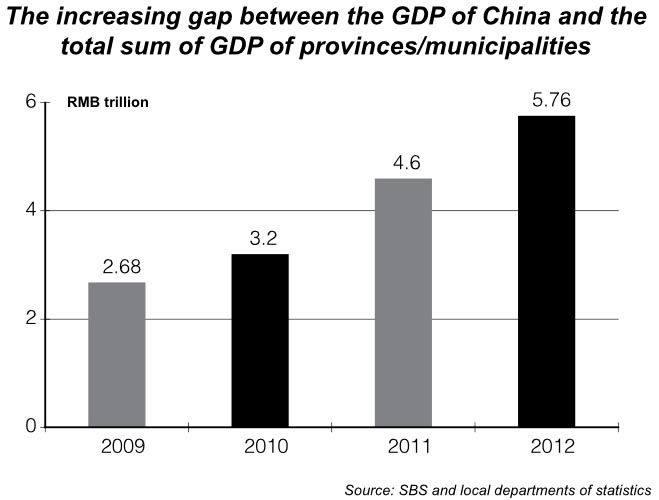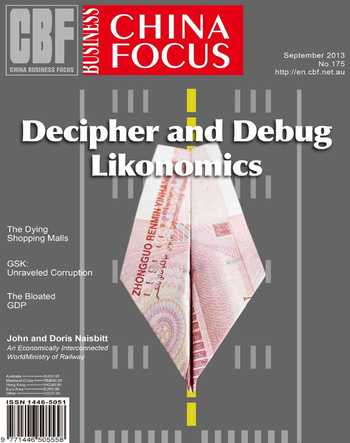The Bloated GDP

On June 28, Chinese pres- ident Xi Jinping pointed out that it is necessary to change the way of checking the performance of local governments. GDP should no longer serve as the only reference or index.
“Presently, we have the second highest GDP in the world. But behind this is the prolonging extensive development pattern. We need to change this,”President Xi said.
A story about “swapping mothers”was widely spread to highlight the problems of focusing on GDP too much: two mothers cannot generate income(GDP) by staying at home and looking after their children. So they pay each other for looking after each others children. Thus they have GDP but ignored the pain of their children.
The Sample of Faking
Local governments of different provinces/municipalities, or their subordinate cities/counties/districts, could usually give out positive and exciting reports about GDP. But the figures on the paper are different from the citizens feeling and could contradict with the central government.
Local governments are always more optimistic than the central government when it comes to the economic development. Why?
In 2012, the total sum of GDP of all provinces/municipalities of China amounted to RMB 57.69 trillion. Then, the State Bureau of Statistics (SBS) made an initial calculation of Chinas GDP, which amounted to RMB 51.93 trillion, RMB 5.76 trillion less than the total sum of data given by local governments. The surplus is even higher than the GDP of Guangdong, the most developed province in China.
Whats worse is that the surplus always exists and kept increasing in recent years. In 2009, the surplus was RMB 2.68 trillion; it increased to RMB 3.2 trillion in 2010, and then to RMB 4.6 trillion in 2011.
The contradictions between central government and local governments concerning GDP are not limited to the unmatched figure. The Chinese central government is now trying to lessen the focus on GDP. The report of the 18th CPC Congress said that the average annual GDP growth is expected to be 7% while the government pays more attention to the structural change than to simple economic development in the 12th Five-Year Plan (2011-2015).
However, the GDP is undoubtedly more important for local governments than the central government, because the leaders of central government want a sustainable development pattern while leaders of local governments want to be promoted to a higher position with high GDP growth rate.
The Mismatched Growth Rate
The confusion caused by the mismatch of the GDP data between local and central governments is only added by the gap between the GDP growth rates of local and central governments.
In 2012, Chinas GDP grew by 7.8% year by year. However, 29 provinces/municipalities reported the GDP growth rate higher than the state level. The only exceptions were Beijing and Shanghai.
Xu Fengxian, a researcher at the Chinese Academy of Social Sciences, attributed the gap to two factors: a), different statistical ranges are used by local and central governments and some sectors are repeatedly counted by local governments; and b), the GDP growth is closely related with the review of local governments performance, forcing each of them to get the the GDP growth rate as much as possible even by bloating it.
Ma Jiantang, director of the SBS, said that the technological problems are partially to blame for the gap.
In order to solve the error caused by statistical technologies and ranges, the SBS set up an online platform last year. This platform is open to 700,000 enterprises (industrial enterprises with certain sizes, retail, wholesale, catering and accommodation enterprises with certain revenues, and architecture and property companies with certain qualities), through which they can directly send their financial data to the platform for the statistical departments of various levels to use when counting the GDP.
But is that enough? At least most experts do not think so. As Xu Fengxian pointed out, most local governments(maybe Shanghai and Beijing excluded) still drive the economic development through investment. A vice governor of a province in Central China said that the central government fixed the goal of GDP growth rate to be 7%-8%, and they had to establish a goal higher than this one.
“Being not an economically powerful province, we need to fix our expected GDP growth rate at over 10% so that the central government could see our efforts. When the economic situation is not good, we need to be more pressing,” said the vice governor.
The current Chinese and international economic situation is no doubt as complicated, if not more than, as the past years, judging from the half-year situation. When speaking of their goal, the aforementioned vice governor said that the goal of GDP growth could be realized, through the investment in infrastructure and industrial parks.
The Hatred for Fake GDP
The blind pursuit for GDP is unreasonable but could be explained. However, some local governments even faked the data of GDP to cheat the central government and the masses.
From last February, the SBS launched a system that requires all en- terprises with certain sizes to directly report the data to the SBS. However, even if the intermediate procedures were removed, the phenomenon that local governments faked data about GDP and other economic indices was not cleared.
In the first half of 2013, the SBS reported that it had a special team to detect any malpractices of local departments of statistics, and the team found that the government of Henglan Town, Zhongshan City, Guangdong Province made the fake data about its industrial output. According to SBSs announcement, the 71 enterprises in that town had the industrial output of RMB 2.27 billion in 2012, but the figure was bloated to RMB 8.51 billion by the local government.
Angered by such an exaggeration, Ma Jiantang held a call conference immediately, in which he seriously criticized over the “fake data” in front of al present enterprises directors and statisticians. “Some local governments still intervene in enterprises reporting of their revenue. Some force local enterprises to change the data, and some upload the data to the central governments system on behalf of local enterprises. Even some enterprises do not follow rules when reporting their financial income. They either directly report false data or fail to submit materials that are needed to confirm the authenticity of the data.”
An insider from the SBS said that the present economic downturn could make more local governments fake the economic data more frequently. Ma Jiantang said that the authenticity of statistical data is of extreme importance for a country.
“Data about enterprises business and performance are the most important references for the government to find any problems in the economic system. Fake data could do nothing good to a country,” said he.
“Actually, it is very easy to distinguish whether the local governments make any fake data or not. The result is very clear when comparing the financial data enterprises have reported with the tax they have paid,” said the aforementioned insider from SBS.
The Real Value of GDP
Ma Jiantang said that local departments of statistics should not be blamed for the fake GDP. Local governments are forced to do so because of the current GDP review system and its relation with local governmental officials future career.
So the key to putting an end this problem is to end the GDP review system, meaning that the central government, which always complained about local governments fake data, should think of its own role in this disgraceful event.
Fortunately, the central government has already realized the problem, which led to President Xis speech. In his speech, Xi Jinping also said that the improvement of peoples livelihood, the social progress, the ecological and environmental protection should be listed as references to review local governments performance while the GDP is considered one of the indices that share the same position with, not superior to, other factors.
Chen Enfu, a member of the Academic Committee at the Chinese Academy of Social Sciences, said that the income of citizens should be the utmost index to review the economic development level. Then their living standard, quality and their “sense of happiness”should be considered as well.
“These things are closely related with GDP and can reveal the true value of GDP growth. Without these things, the simple GDP growth is meaningless,” said Cheng.
Prof. Yang Kaizhong from Beijing University invented a calculation formula, according to which the Chinese Economic Research Institute made a“Ranking of Provinces/Municipalities in the Value of GDP”, which has been published four times. The Ranking is expected to have a true reflection of the economic development quality of each province.
The value of GDP is gained by dividing the disposable income per capita with GDP per capita. In the GDP growth rate is not positively related with the value of GDP.
In 2012, Guangdong, Jiangsu, Shandong, Zhejiang and Henan are the top five provinces in China in terms of GDP volume. However, the five provinces were respectively ranked at the 3rd, 19th, 26th, 4th and 24th places when it comes to the value of GDP. The rankings of Shandong and Henan in the value of GDP are far from their places in the list of GDP volume.
Prof. Yu Qiao from Tsinghua University said the GDP is important for governmental officials, but means little for citizens, who care about their income, the environment quality of where they live, and the social security.

